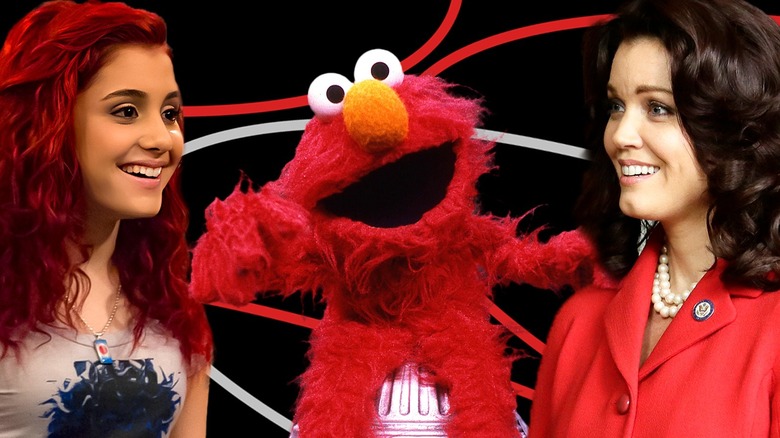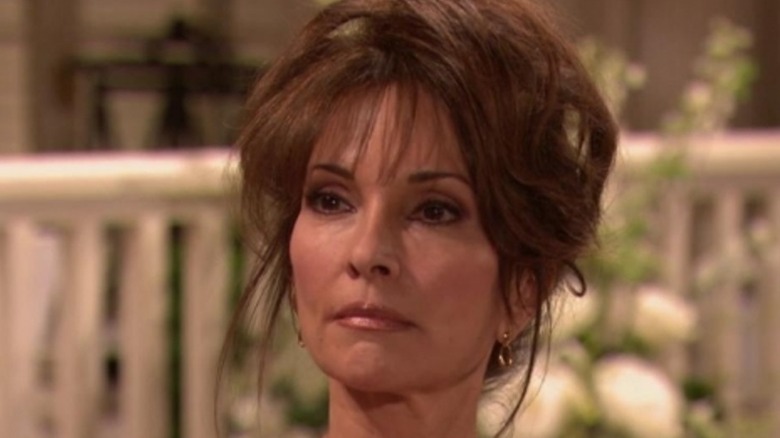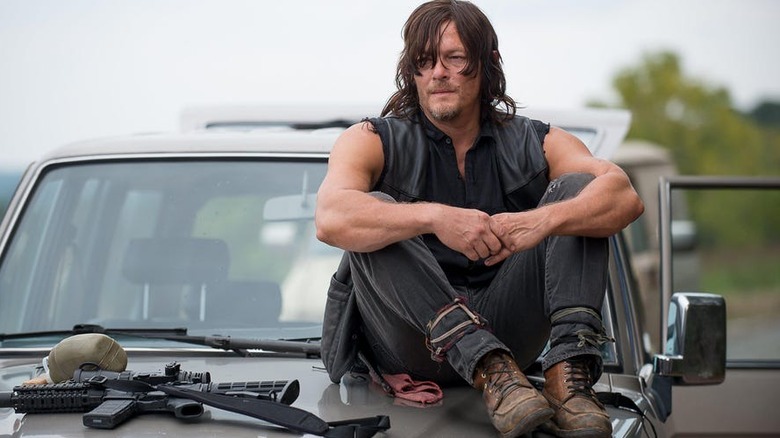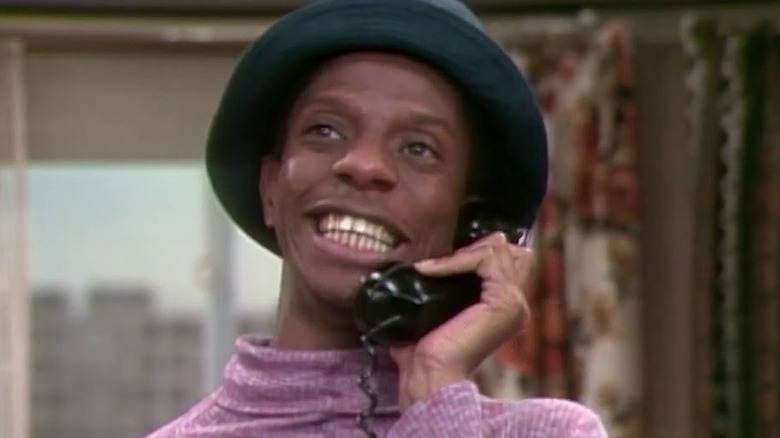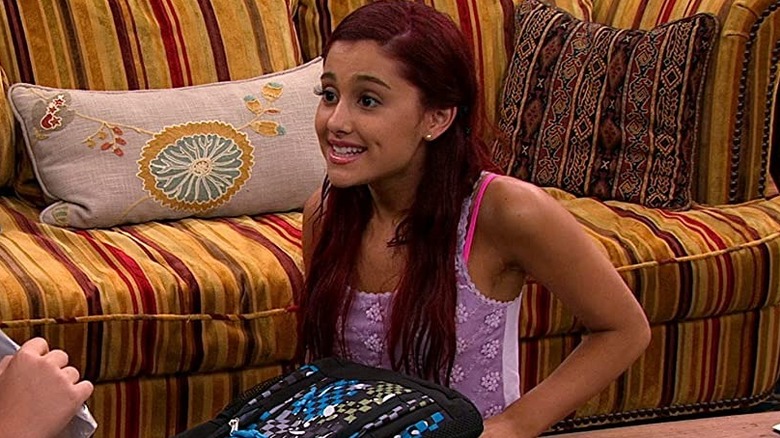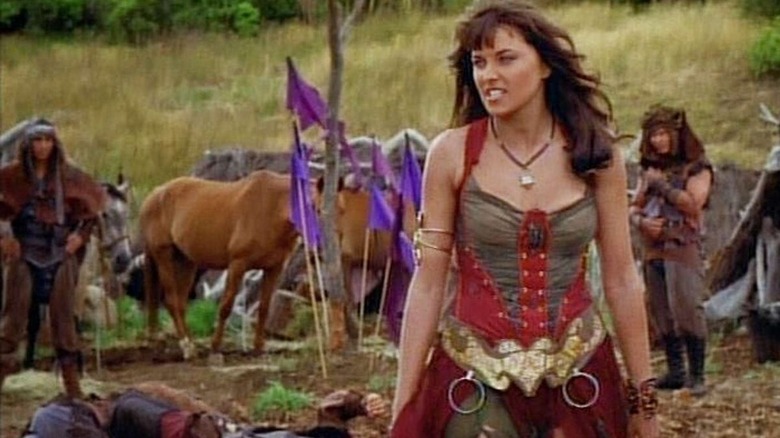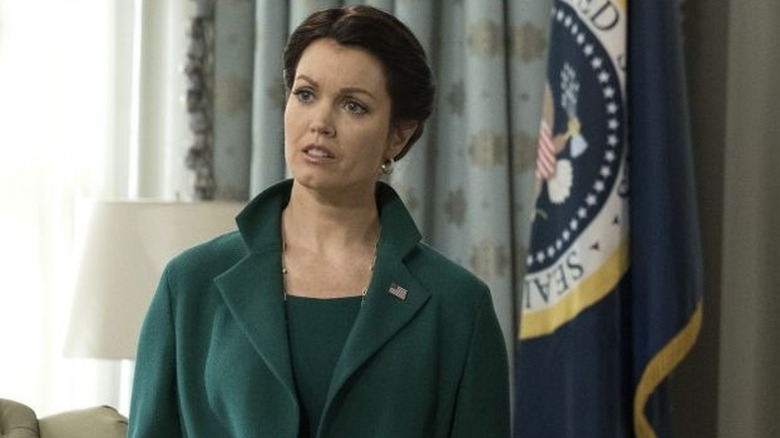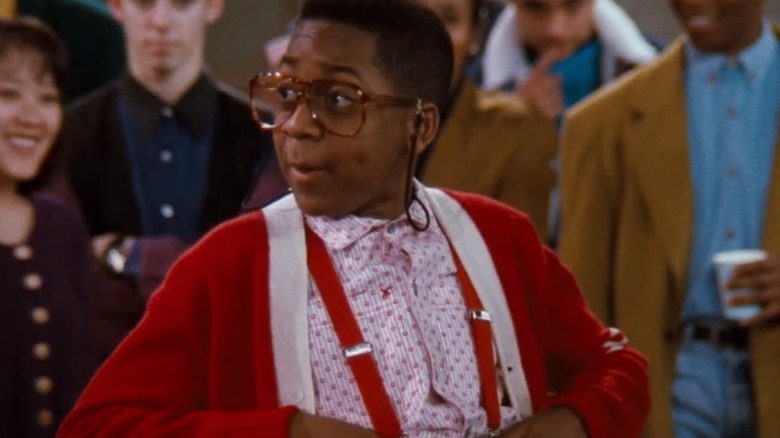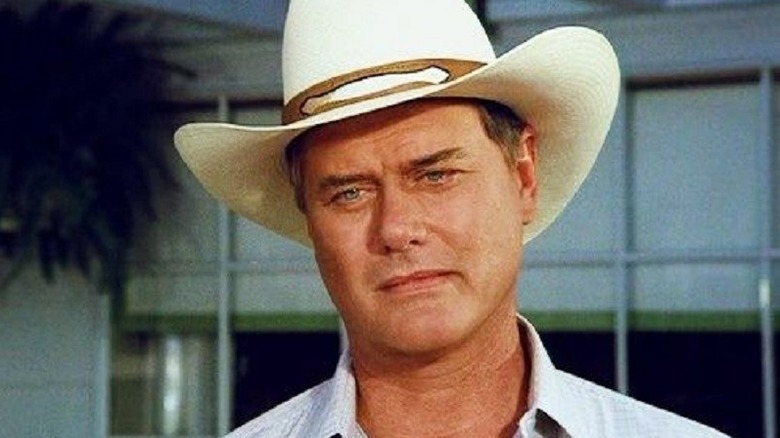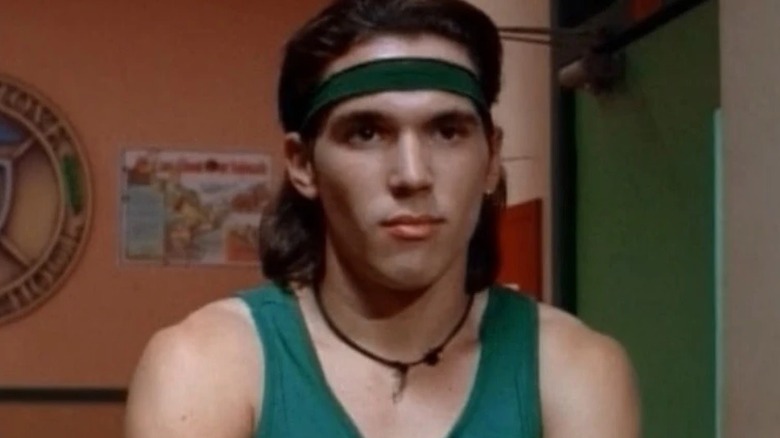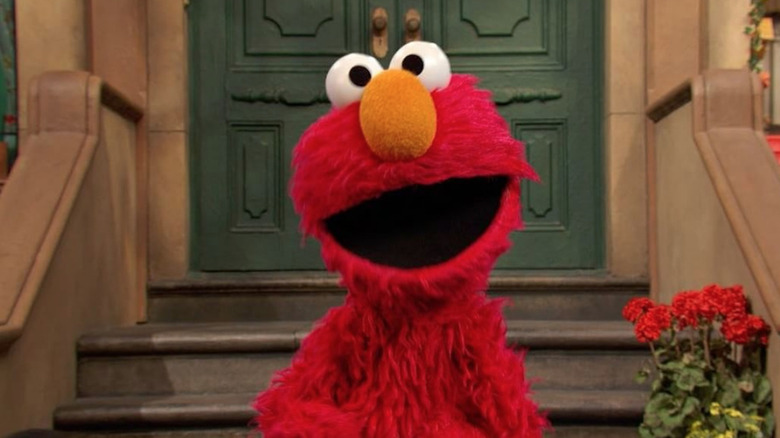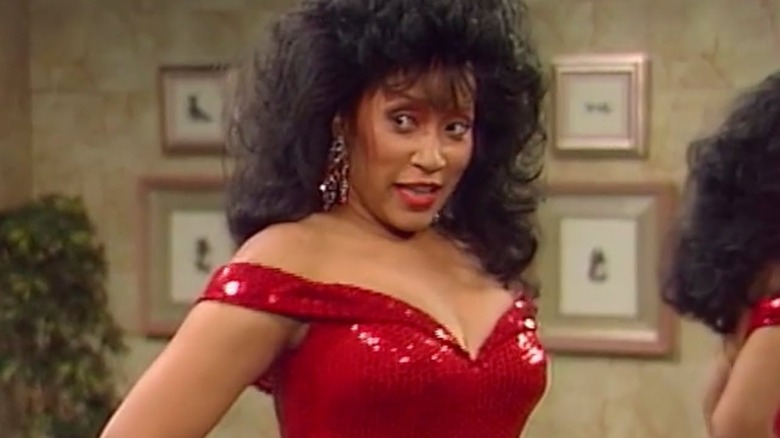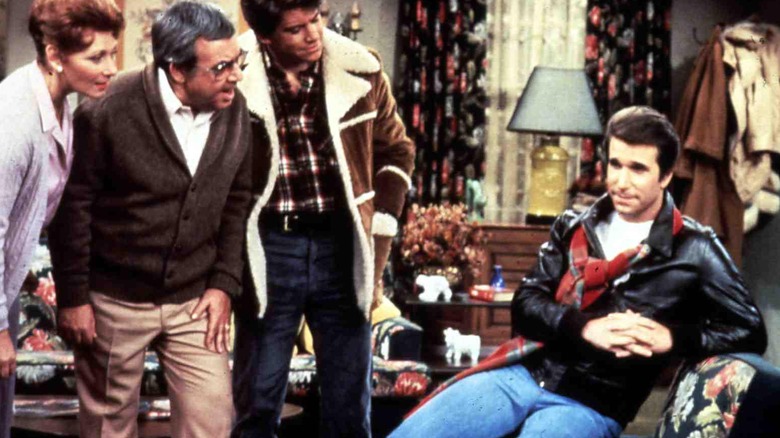TV Shows Where Side Characters Became The Breakout Star
Most TV shows, no matter the genre, tend to be at least partially ensemble-based. You'd be hard-pressed to think of too many series that literally only stars one person — and even ones that do, like HBO's "Tracey Takes On...," will generally rely on a vast array of guest performers. That being said, there are definitely plenty of shows that have a clearly-defined "main character." Sitcoms often fit into this mold, frequently built around the comedian or big-name actor that helped to create the show and who usually base it around either a version of themselves or some character they had already developed from their stand-up act or another previous project.
Sometimes, a character will become the lead character as a series goes on even though they weren't originally intended to be so. Whether their popularity eclipsed that of the person that was supposed to be the lead, or they simply became the clearly-defined protagonist of what had previously been an ensemble piece, sometimes a show's audience zeroes in on a supporting character and leads to the show being retooled in order to give that character more — if not the most — screen time.
To be clear, we aren't including examples where a side character was deliberately introduced in order to set up an eventual spin-off, or when an actor's career blew up but their role on the show in question didn't necessarily get any bigger (like Ashton Kutcher in "That '70s Show" or George Clooney in "ER").
All My Children - Erica Kane
It's difficult to think of a more drastic version of this trope, as Susan Lucci's Erica Kane not only became the protagonist for "All My Children" for the bulk of its run but has also been called "unequivocally the most famous soap opera character in the history of daytime TV" by TV Guide.
But Erica's initial role within the world of "All My Children" during its early episodes back in 1970 was definitely not meant to be the lead. Rather, it was Tara Martin (first portrayed by Karen Lynn Gorney), who was the sweet and innocent teenager that the show was initially built around in the early planning stages and with the Martins meant to be the main family of the "All My Children" universe.
Erica was to be one of Tara's rivals, but it wasn't long before Erica's popularity demanded that she take center stage instead — and the Kanes eventually became the central family of the entire series. The rest is literally history, with Erica being one of the biggest characters and Lucci one of the most iconic stars of the entire genre, if not television as a whole.
The Walking Dead - Daryl Dixon
Rick Grimes was the lead character of "The Walking Dead" comic book series for nearly 200 issues before finally meeting his demise in 2019. It was therefore a no-brainer that Rick also be made the main protagonist of AMC's television adaptation of the comics when it debuted in 2010, with Andrew Lincoln playing the iconic character. And while Rick arguably continued to play that role until Lincoln's departure in Season 9, someone else very quickly became the fan favorite and was the true star of the show for most of its 11-season run.
In fact, Daryl Dixon was one of the original creations for the show (who hadn't previously existed in the comic), written by series creator Frank Darabont specifically to get actor Norman Reedus involved. It was supposed to just be a guest spot for a few episodes before Daryl eventually faced the same fate that most side characters do in the "The Walking Dead" universe, but his near-immediate popularity proved too great to have him become zombie food.
Reedus was game, so he stayed on as a main cast member beginning with the second season — with Daryl eventually becoming not only the show's most popular protagonist but also one of its longest-surviving characters.
Good Times - J.J. Evans
One of the most common sitcom tropes there is, going back to the very beginnings of the genre itself, is the token wacky character. They'll usually say or do something funny — to the chagrin of one of the more serious cast members — and bask in a few moments of audience laughter. Sometimes, these characters get so popular that a show is reconfigured to allow them more screen time and give them a bigger role in more storylines.
This was the case with the 1970s sitcom, "Good Times," initially meant to be a bittersweet look at the Evans family focusing specifically on the parents as they struggle to make ends meet in their Chicago housing project apartment. But when J.J. (Jimmie Walker), one of the three Evans children, got increasingly popular thanks to his goofy antics and his signature "dyn-o-mite!" catchphrase, he got a lot more of the spotlight and the show itself began to lean a lot more heavily into jokes and comedy than it had before.
This didn't sit well with Esther Rolle or John Amos, who played the Evans parents, and both were outspoken about the shallowness of the J.J. character and how upsetting it was that the other two kids' roles were so greatly diminished. In fact, Amos' character was subsequently killed off after three seasons, and Rolle left the show in Season 5, though she did return for the sixth and final season.
Victorious - Cat Valentine
Not counting the alumni of "The Mickey Mouse Club," there are few stars who got their start on a Disney or Nickelodeon teen sitcom that has since gone on to bigger success than Ariana Grande. Her list of accomplishments as a musician is a long one, including being the most streamed female artist of the 2010s and the first artist to have their first four singles all debut at #1 on the Billboard Hot 100 chart. Not bad for someone who wasn't even the star of the show she started out on.
Sure, it's obvious that shows like "Hannah Montana," "Lizzy McGuire," "iCarly," and "Victorious" were designed in part to make eventual superstars out of their leads, but while Victoria Justice of "Victorious" has done fine for herself, co-star Grande is not only the biggest star to come from that show, but Grande's character, Cat Valentine, quickly established herself as an incredibly funny and charming scene stealer.
It was pretty obvious pretty early on that Grande was headed for big things by how fully Cat had taken over "Victorious" — and she was definitely the more popular of the two leads of the "Victorious" and "iCarly" dual spin-off series, "Sam & Cat," despite being second-billed.
Hercules: The Legendary Journeys - Xena
For those who aren't in the know, it's easy to assume that the character of Xena (Lucy Lawless) was introduced in "Hercules: The Legendary Journeys" specifically for the purposes of setting up her eventual standalone spin-off. But fans of both shows know that that's not remotely the case. Not only was Xena always intended to be a villain to Hercules (Kevin Sorbo) for just a single, three-episode arc of "Hercules," she wasn't even supposed to survive.
But Xena's popularity soared — so quickly, in fact, that her storyline was changed to see the character not only survive her arc in "Hercules" but reform into a hero in order to set the stage for her own self-titled spin-off series. This might have technically made her the breakout star of "Hercules" specifically, but "Xena: Warrior Princess" quickly became the more popular of the two shows, and the character a far more beloved protagonist than Hercules within the interconnected universe.
In fact, of the two series, "Xena" is the one that has the more enduring legacy and has seen a more passionate and ongoing call for a revival of some kind — and the fact that Sorbo has proved to be a controversial public figure in recent years while Lawless has been far less problematic has helped to keep the latter's show from having its legacy tarnished in the same way that Sorbo's controversial statements and opinions have done to "Hercules."
Scandal - Mellie Grant
One of the longer-running Shonda Rhimes shows that doesn't take place in a hospital or otherwise adjacent to people saving lives is "Scandal,' which lasted for seven seasons on ABC in the 2010s. Starring Kerry Washington as D.C. crisis manager, Olivia Pope, it was definitely Washington's breakthrough role and the series felt very much like a star vehicle for the rising actor. But it would only take a little while for one of the show's side characters to not only rise to prominence but become its new unofficial lead.
In fact, Mellie Grant (Bellamy Young) was only intended to be on the show for a few episodes of the first season, initially playing the First Lady to embattled President Grant (Tony Goldwyn). As explained by The Daily Beast, Grant was meant to be a character that the fans would hate, only for her to eventually become "the most complex, fun character on 'Scandal.'"
Mellie went from former, divorced First Lady to the senator of Virginia and, finally, the first female president of the United States by the time Season 6 came to a close. From a minor recurring role as a First Lady culminating in becoming president? That's a character arc for the ages.
Family Matters - Steve Urkel
Like "Good Times," "Family Matters" was initially conceived as a sitcom that took a funny but still grounded and sometimes challenging look at a close-knit Midwestern family — and with the two heads of the Winslow household to frequently be at the center of most of the story arcs. And, just like with "Good Times," a character that was only supposed to deliver occasional and brief bouts of comic relief proved too popular to stay relegated to infrequent side character status.
The case of Steve Urkel (Jaleel White) completely and utterly taking over "Family Matters" was actually even more drastic than what J.J. did to "Good Times," since Urkel wasn't a member of the main family nor a top cast member at first. But his trademark nasally delivery, penchant for physical comedy, and cheesy one-liners were an instant hit with audiences, and the show was very quickly retooled around him, soon becoming the central character of most storylines which became more outlandish and high-concept as a result.
Further adding to the similarities to "Good Times" is that the actors who played the Winslow parents — Jo Marie Payton and Reginald VelJohnson — resented the new direction that the show took following Urkel's popularity. Although, in this case, some of that stemmed from the tension between the actors and White, with Payton recalling a time that she and White almost came to blows on the set and VelJohnson saying that working with White "was a challenge."
Dallas - J.R. Ewing
The "Who shot J.R.?" campaign that followed the Season 3 finale of the primetime soap opera, "Dallas," was a major pop culture event in 1980. It not only set up the Season 4 premiere to be the highest-rated television episode in history at the time but it is considered to have established the trope of television seasons endings on major cliffhangers that wouldn't be resolved until the beginning of the next season.
A big part of the reason why the world was so obsessed with finding out who shot J.R. Ewing (Larry Hagman) is that he had become one of the most popular characters on television in one of the biggest shows at the time. What's even more fascinating about J.R.'s popularity and his place as the lead character in "Dallas" is that the show wasn't originally set up that way. Rather, "Dallas" was supposed to be a huge ensemble piece about the warring Ewing and Barnes families and how the marriage of Bobby Ewing (Patrick Duffy) and Pamela Barnes (Victoria Principal) made that feud even more complicated and volatile.
But Bobby's older brother quickly became the fan favorite and it wasn't long before the focus shifted to him as the de facto main character of the series, in addition to its subsequent sequel movies. The 2012 revival series only had J.R. in a supporting role, but it's no accident that who it did focus on was his son, John Ross Ewing III (Josh Henderson).
Mighty Morphin Power Rangers - Tommy Oliver
"Mighty Morphin Power Rangers" is a unique series in that it has been consistently on the air since 1993, but it rebrands itself every one to three seasons with a new angle, new title, and mostly a new cast of characters. While there have been a few minor recurring members of one cast who make an appearance in another, the only major character to have ever had a significant ongoing presence across the entire franchise is Tommy Oliver (Jason David Frank). Tommy first appeared in the original incarnation of the series and continued to return throughout the franchise up through 2018's "Power Rangers Ninja Steel."
Tommy becoming one of the most popular and longest-serving characters in "Power Rangers" is surprising for two reasons. First, he wasn't one of the original Rangers in "Mighty Morphin," and second, he was a villain before he was a Ranger. Nevertheless, when he went from being the evil Green Ranger to the powerful White Ranger in Season 3 of "Mighty Morphin," he also became the new leader of the team as well as the main character of the series.
Tommy not only appeared in a further seven incarnations of the "Power Rangers" TV series for a total of 217 episodes, but he would also play a significant role in various comic book storylines. All of this from a character that was originally only meant to appear in a five-episode arc.
Sesame Street - Elmo
While it's true that various members of the "Sesame Street" gang have seen various spikes in popularity over the show's long history — with Big Bird, Bert & Ernie, Cookie Monster, and Oscar the Grouch all having degrees of breakout success and minor crossover stardom — no other single original character can claim to have had the level of crossover success nor the show-conquering level of popularity that Elmo has had.
Don't believe us? Name another Muppet on the show that had a whopping 15 minutes of each show dedicated entirely to their own self-titled segment for over a decade. Only "Elmo's World" has that distinction, being a regular fixture on the show between 1998 and 2009 and having returned at various points for varying lengths since then. Elmo effectively was "Sesame Street" for the generation that grew up with it during that time, and his popularity grew beyond the show in a way that almost no other character ever did, at least not for such a sustained period.
It's also not an accident that he tends to be at the center of most of the big viral moments that "Sesame Street" has been involved with in more recent years, from Julia Louis-Dreyfus' resurfaced clip of her letting slip a naughty word in front of Elmo, to Katy Perry donning an outfit of questionable appropriateness that contained his image, to the compilations of him getting annoyed at Zoe's pet rock that had us all cracking up.
227 - Sandra Clark
After becoming a breakout character herself in "The Jeffersons" as maid Florence Johnston, actor Marla Gibbs was gifted her own star vehicle in 1985 when she was made the lead of the NBC sitcom, "227." Set in an apartment building whose street address gave the series its title, "227" was to revolve around the Jenkins family — Mary (Gibbs), her husband Lester (Hal Williams), and daughter Brenda (Regina King in her screen debut).
But Gibbs soon lost the spotlight to another actor, Jackée Harry, who played Mary's neighbor. Harry is a natural-born scene stealer with her larger-than-life presence, and it didn't take long before Sandra's role in "227" far surpassed that of the fun neighbor who only pops in from time to time. For her role as Sandra, Harry made history in 1987 when she became the first black woman to win the Emmy for outstanding supporting actress in a comedy series. While there was a pilot filmed for a planned Sandra-focused spin-off called "Jackée," it ultimately didn't pan out and that pilot is now shown in rerun packages as a "227" episode titled "Jackée."
Happy Days - Fonzie
Whatever you want to call him — Arthur Fonzarelli, Fonzie, or The Fonz — Henry Winkler's leather jacket-wearing, one-liner-spouting, jukebox-punching tough guy went from side character to breakout star in "Happy Days" at lightning speed. In fact, he's considered one of the go-to examples of the trope of a side character that took over a show, which proves to be an interesting companion fact to Fonzie also being part of the infamous event that gave the term "jumping the shark" its name.
Long before Fonzie was part of the moment where "Happy Days" took a turn for the worst and invented the term for any show that has a moment where it peaks in quality, he was first a character that wasn't important enough to be included in the show's opening credits. But that changed quickly, as Winkler became a main cast member by Season 2 and was prominently showcased during the show's iconic opening theme alongside all the existing series regulars.
The Fonz would be one of only three actors to be a consistent regular from the show's second through its 11th and final season alongside Potsie (Anson Williams) and Mr. & Mrs. Cunningham (Tom Bosley and Marion Ross), with Fonzie's status as the show's new main lead only further cemented following the exits of Richie Cunningham (Ron Howard) and Ralph Malph (Don Most) in Season 7.
